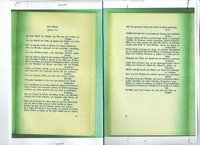
The poem wasn't published until 1875, so I don't think he gave away any military secrets by jotting a few impressions of his surroundings. It's possible that my translation is the first time this poem has ever been rendered in English.
Illustrious city, daughter of the sea by the father of waters,
As the goddess her love, so wash your waves on the shore
Where you lodge praying in the lap of eternal youth.
As a fairy-tale you appear to the northern foreigner,
Who arrives from the news-hungry, snow-bound lands,
Where a gloomier heaven with smoking cities is stored,
As bewitched he gazes above through the silvered clouds,
To the blue of heaven's secret, and glimpses an earth
Where the sun heaps its gold on the land and the water.
Midway in winter he greets the dark leaf of the oranges,
And marvels at the glorious tree with the golden apples,
Whose unfurled blossoms the ripe and ripening fruit adorns.
Astonished, he considers those from these houses with such planted elegance,
And out of the leaves stalks the refined stem of the banana with blades
Like fluttering fans cradled by the breeze.
Joyful and serene, these people delight in their fortunate ease,
As the bird in the forest volunteers heaven's gifts.
Lovely it is to live here, and tied with no strings
Stronger than the earth's girdle, mine on the cold Wisconsin,
Where the cedar grows and the sap seeps from the sycamore.
I could gladly in the sunny fields of Louisiana
Build a cottage in the country, where the roses
Never weary to bloom, where the figs and the myrtle grow,
And the mocking bird nests in the pomegranate bush.
Fertile soil here richly rewards manly labor;
A few handfuls of maize, with modest effort early in the year,
After planting the summer before, springs up wild corn,
Giving me bread enough; the forest's flying bees
Lead me lightly to the hive, where their honeycomb lies;
My kitchen supplies the hunt, a single shotgun round
In the drunken clouds where sunshine besotted pigeons
Lay in abundance about the feet, both wild and tame
Teem in the woods, where quick as a shadow, scurrying turkeys
Follow an alluring call, to the black-watered bayou
The thirst of the evening conducts the languishing stag,
And the opossum tricks its pursuer with the semblance of death.
Far from life's sorrows and far from torturous labor
I wander in the shadows of always green oaks,
Tall cypresses and lovely beloved magnolias, whose blooms
The color of snow, shed a fragrance to shame the lindens.
Meanwhile the men of the north, who toil in halved years,
Arrive to defend their misery and coldness.
I consider this a provisional translation. Comments or suggestions for ways to improve it would certainly be welcome, especially from readers whose first language is German.